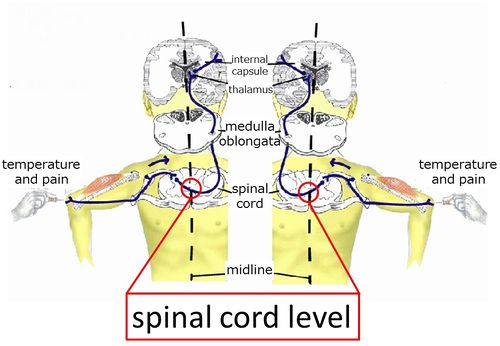「Nerve05/disorders of the spinal cord and optic pathway/ascending pathway of deep and touch sensation」の版間の差分
Soichi.Nakatake (トーク | 投稿記録) 編集の要約なし |
編集の要約なし |
||
| 4行目: | 4行目: | ||
{{QuizTitle}} | {{QuizTitle}} | ||
<GIFT> | <GIFT> | ||
//LEVEL:3 | //LEVEL:3 | ||
//RAND | //RAND | ||
Deep sensation from joints and muscles travels through the {~spinothalamic tract | Deep sensation from joints and muscles travels through the {~spinothalamic tract~=posterior column-medial lemniscus pathway~corticospinal tract (pyramidal tract)}. | ||
//LEVEL:3 | //LEVEL:3 | ||
//RAND | //RAND | ||
Touch/pressure sensation of the skin travels through the {~spinothalamic tract | Touch/pressure sensation of the skin travels through the {~spinothalamic tract~=posterior column-medial lemniscus pathway~corticospinal tract (pyramidal tract)}. | ||
//LEVEL:3 | //LEVEL:3 | ||
//RAND | //RAND | ||
Deep sensation from joints and muscles travels through the {~anterior | Deep sensation from joints and muscles travels through the {~anterior~lateral~=posterior} funiculus (column) of the spinal cord. | ||
//LEVEL:3 | //LEVEL:3 | ||
//RAND | //RAND | ||
Skin touch/pressure sensation travels through the {~anterior | Skin touch/pressure sensation travels through the {~anterior~lateral~=posterior} funiculus (column) of the spinal cord. | ||
//LEVEL:3 | //LEVEL:3 | ||
//NO-RAND | //NO-RAND | ||
In the pathway for deep sensation from joints and muscles, the {=1st | In the pathway for deep sensation from joints and muscles, the {=1st~2nd~3rd} sensory neuron ascends the spinal cord. | ||
//LEVEL:3 | //LEVEL:3 | ||
//NO-RAND | //NO-RAND | ||
In the pathway for skin touch/pressure sensation, the {=1st | In the pathway for skin touch/pressure sensation, the {=1st~2nd~3rd} sensory neuron ascends the spinal cord. | ||
//LEVEL:3 | //LEVEL:3 | ||
//RAND | //RAND | ||
For deep sensation from joints and muscles, the pathway enters the spinal cord from the {~anterior | For deep sensation from joints and muscles, the pathway enters the spinal cord from the {~anterior~=posterior} root, {~does~=does not} synapse immediately afterwards, and ascends the {~spinothalamic tract~=posterior column-medial lemniscus pathway~corticospinal tract (pyramidal tract)} of the {=same~opposite} side of the spinal cord, synapses in the {=medulla oblongata~hypothalamus}, {~ascends the same side~=crosses to the other side}, synapses in the {=thalamus~hypothalamus}, travels through the {~basal ganglia~=internal capsule~limbic system}, and reaches the {=primary somatosensory cortex~primary motor cortex} in the {~precentral gyrus~=postcentral gyrus} in the {~frontal~temporal~=parietal~occipital} lobe. | ||
| 39行目: | 55行目: | ||
//LEVEL:3 | //LEVEL:3 | ||
//RAND | //RAND | ||
For touch/pressure sensation of the skin, the pathway enters the spinal cord from the {~anterior | For touch/pressure sensation of the skin, the pathway enters the spinal cord from the {~anterior~=posterior} root, {~does~=does not} synapse immediately afterwards, and ascends the {~spinothalamic tract~=posterior column-medial lemniscus pathway~corticospinal tract (pyramidal tract)} of the {=same~opposite} side of the spinal cord, synapses in the {=medulla oblongata~hypothalamus}, {~ascends the same side~=crosses to the other side}, synapses in the {=thalamus~hypothalamus}, travels through the {~basal ganglia~=internal capsule~limbic system}, and reaches the {=primary somatosensory cortex~primary motor cortex} in the {~precentral gyrus~=postcentral gyrus} in the {~frontal~temporal~=parietal~occipital} lobe. | ||
</GIFT> | </GIFT> | ||
2014年11月18日 (火) 21:43時点における版
For deep sensation from joints and muscles and skin touch/pressure sensation, the pathway enters the spinal cord from the posterior root, and does not synapse immediately afterwards; rather the first sensory neuron fiber ascends the posterior column-medial lemniscus pathway of the same side of the spinal cord to the medulla oblongata, where it synapses and the second neuron crosses to the other side.
Challenge Quiz
Deep sensation from joints and muscles travels through the spinothalamic tract posterior column-medial lemniscus pathway corticospinal tract (pyramidal tract) .
Touch/pressure sensation of the skin travels through the spinothalamic tract posterior column-medial lemniscus pathway corticospinal tract (pyramidal tract) .
Deep sensation from joints and muscles travels through the anterior lateral posterior funiculus (column) of the spinal cord.
Skin touch/pressure sensation travels through the anterior lateral posterior funiculus (column) of the spinal cord.
In the pathway for deep sensation from joints and muscles, the 1st 2nd 3rd sensory neuron ascends the spinal cord.
In the pathway for skin touch/pressure sensation, the 1st 2nd 3rd sensory neuron ascends the spinal cord.
For deep sensation from joints and muscles, the pathway enters the spinal cord from the anterior posterior root, does does not synapse immediately afterwards, and ascends the spinothalamic tract posterior column-medial lemniscus pathway corticospinal tract (pyramidal tract) of the same opposite side of the spinal cord, synapses in the medulla oblongata hypothalamus , ascends the same side crosses to the other side , synapses in the thalamus hypothalamus , travels through the basal ganglia internal capsule limbic system , and reaches the primary somatosensory cortex primary motor cortex in the precentral gyrus postcentral gyrus in the frontal temporal parietal occipital lobe.
For touch/pressure sensation of the skin, the pathway enters the spinal cord from the anterior posterior root, does does not synapse immediately afterwards, and ascends the spinothalamic tract posterior column-medial lemniscus pathway corticospinal tract (pyramidal tract) of the same opposite side of the spinal cord, synapses in the medulla oblongata hypothalamus , ascends the same side crosses to the other side , synapses in the thalamus hypothalamus , travels through the basal ganglia internal capsule limbic system , and reaches the primary somatosensory cortex primary motor cortex in the precentral gyrus postcentral gyrus in the frontal temporal parietal occipital lobe.
